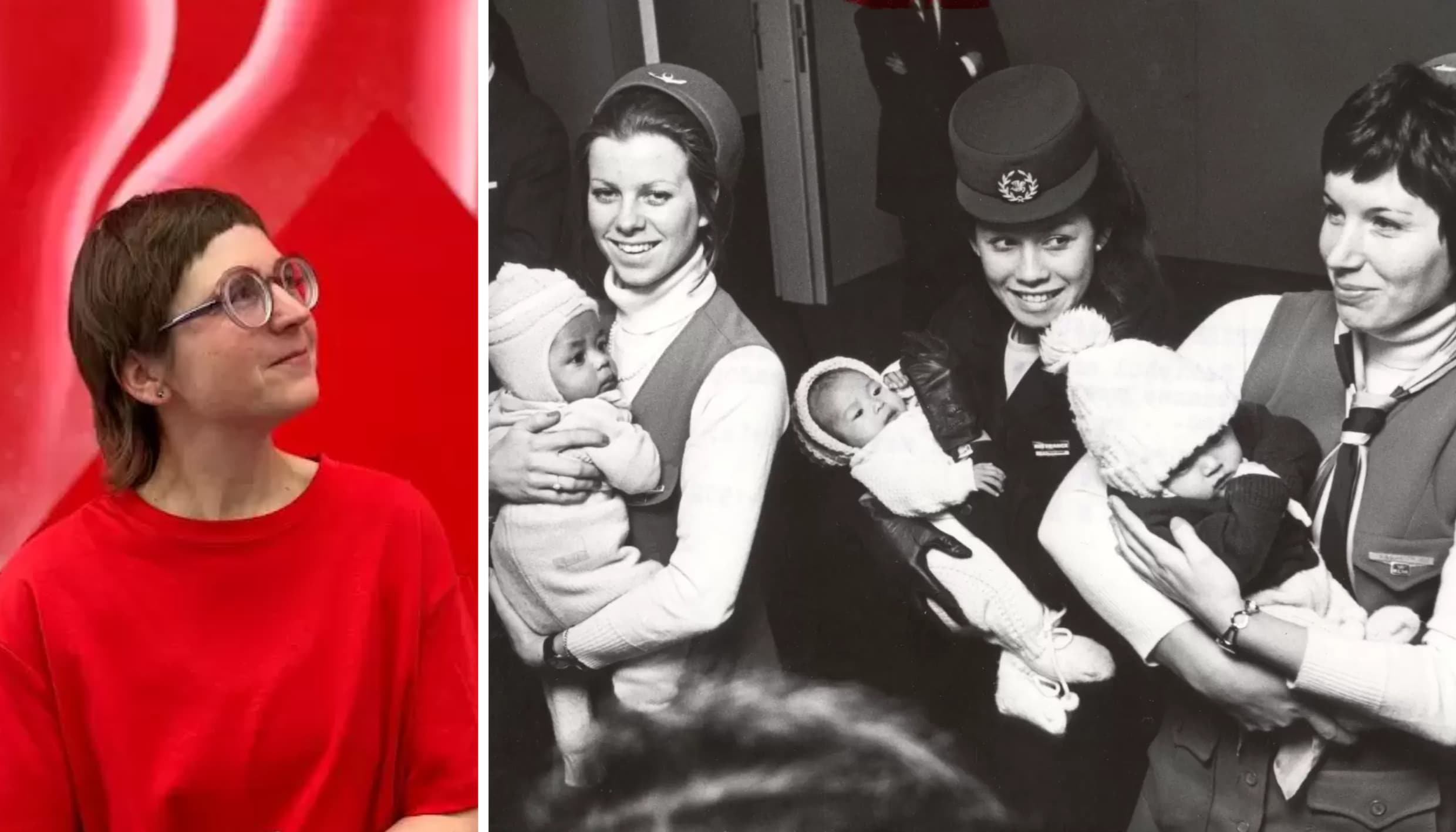Adoption is not a fairy tale: why adoptees are critical of new VRT program
Adoption is not a fairy tale: why adoptees are critical of new VRT program

Korean adopted children arrive at Schiphol Airport on February 21, 1972. Many international adoptions were accompanied by fraud, including in Belgium, writes Lien Lammar.Source rv / Spaarnestad
Adoption is rarely a bed of roses, writes freelance journalist Lien Lammar. She wants more understanding for the harsh reality that adoptees face.
This article was written byLien LammarPublished on October 24, 2025, 3:00 AM
Save
To share
Who considers the grief and loss that come with adoption? It's a short sentence on the back cover of the book that's been in my backpack since Saturday. I bought it at the Muntpunt library in Brussels, where I went to listen to Ae Ra Van Geel and Kiran Van der Avert. They co-authored the book "(On)gewenst" (Un)gewenst , about the complex reality of the adoption fairy tale , as the subtitle reads.
Ae Ra and Kiran, both adopted, use their personal experiences, testimonies from adoptees, research, and academic literature to make the dark side of adoption visible and tangible. They focus on the lasting impact of transnational adoption, both on the adoptees and on parents who lose their child to adoption. This is particularly interesting, as the authors tell me that countless books and studies on adoption have been written or conducted by people who themselves were not relinquished, relocated, or adopted.
Most of the literature mainly highlights the positive, rosy aspects of adoption and offers little room for a realistic view that also examines the pain points.
Dream
If only VRT had acquired this book. Last week, the public broadcaster launched a call for a new television program. "Have you been missing a family member for years and longed to find them? Are you searching for a special someone you've lost touch with? Or have you always wondered about your origins?" Tine Embrechts, Annabet Ampofo, Hakim Chatar, and Stephanie Planckaert are already gearing up to embark on a quest with a team of experienced researchers and experts.
Of course, this show was conceived with good intentions. Bringing people together is hard to argue with. However, the creators forget—or ignore—that a reunion isn't a fairytale ending, but merely the beginning of a new, very complex chapter, as Ae Ra and Kiran point out in (Un)Wanted . Finding your family again is an overwhelming experience, accompanied by strong emotions of both joy and happiness, as well as deep grief and pain .
For most adoptees, a reunion is an almost impossible dream, due to incomplete, falsified, or simply missing adoption records. In the Netherlands, the program "Spoorloos" (Spoorloos) was canceled earlier this year after 35 years when it emerged that several people had been linked to the wrong family over the years. Is it any wonder that almost all the adoptees sitting next to me in Muntpunt are dismayed by the new VRT program?
All's well that ends well
For years, experts by experience and adoption experts such as Yung Fierens, chair of CAFE (Critical Adoptees Front Europe), have been working to highlight the abuses in adoptions and the lack of aftercare for adoptees and their families.
They point to years of large-scale fraud in international adoption, to a system that puts the wishes of prospective parents above the interests of the child, and to the need for proper support for adoptees who have questions about their origins.
By the latter, they mean structural, well-considered support from the government, which has long normalized and even encouraged adoption. Not a feel-good TV show that believes in a "happy ending" story when adoptees can finally embrace their mother, father, brother, or sister. The VRT (Flemish public broadcaster) missed the point – yet again, responded Yung Fierens, and I can only agree with her.
Intense can opener
I'm not adopted. I was born and raised in Belgium without ever being taken away from my parents. A book like Ae Ra and Kiran's is an intense eye-opener. They vividly describe the heavy burden that adoptees carry with them forever. It covers the loss of language and culture, the impact of the rift between mother and child that is barely comprehensible, and the mental health issues many adoptees struggle with. A disturbing fact: adoptees have a higher risk of depression and four to five times more suicide attempts.
When adoptees become aware of the impact their adoption has on their lives, it's often described as "coming out of the fog." Even non-adopted people can experience this. The more I hear and read about adoption, the greater my astonishment and outrage that there isn't more astonishment and outrage. Among journalists, publishers, politicians, and psychologists, for example.
Oddly enough, exact figures aren't available, but since the mid-1960s, at least 23,000 foreign children have been adopted in Belgium. That's enough people to be collectively concerned about, right?
Spoiler of fun
With their book, Ae Ra and Kiran aim to inform other adoptees, and by extension, society as a whole, and offer insight into the potential impact of adoption and relinquishment. Their writing is illuminating, relevant, and necessary. It's also bold, because anyone who dares to break the spell of the adoption fairytale is sometimes seen as a nuisance or a party pooper by adoption agencies, adoptive parents, and policymakers. Or by program makers looking for adoptees.
I will never fully experience the pain and sorrow of adoptees. What I can, or more importantly, want to, is help ensure their voices are no longer unheard or unwanted. It's high time we, as a society, change our perspective on adoption and take adoptees' needs for help seriously. We can do without a television program, however well-intentioned. A book like (Un)Wanted, on the other hand, could easily become required reading.
Help us by sharing your experience: Giving feedback